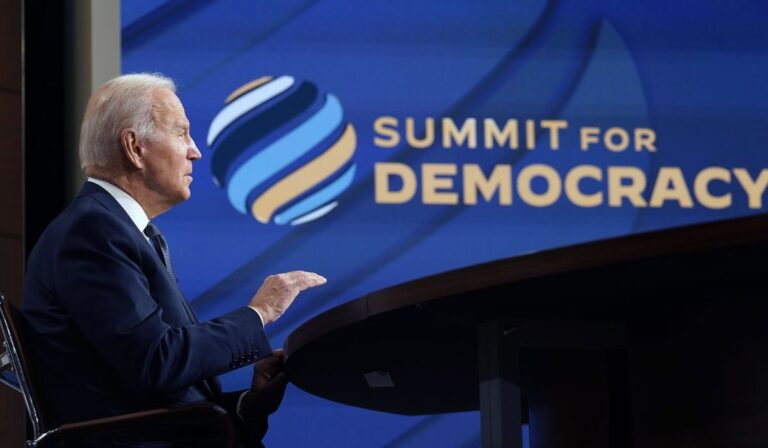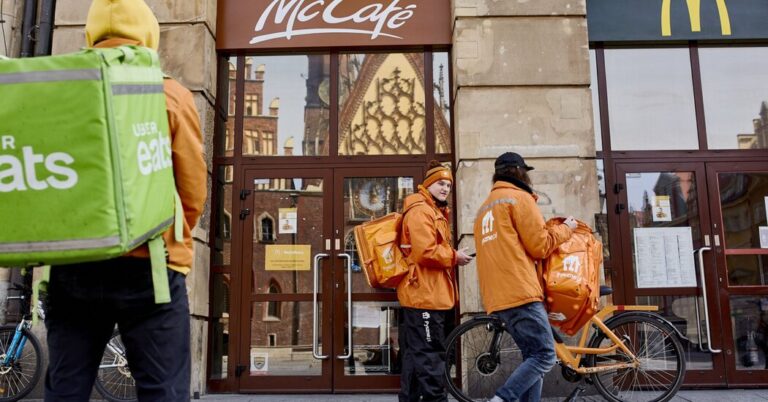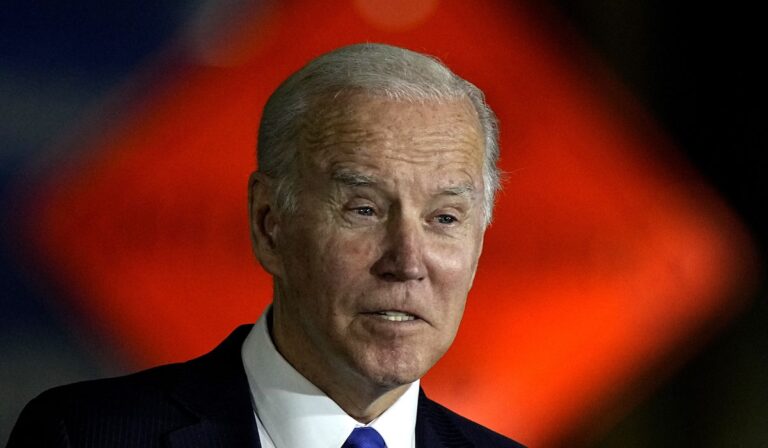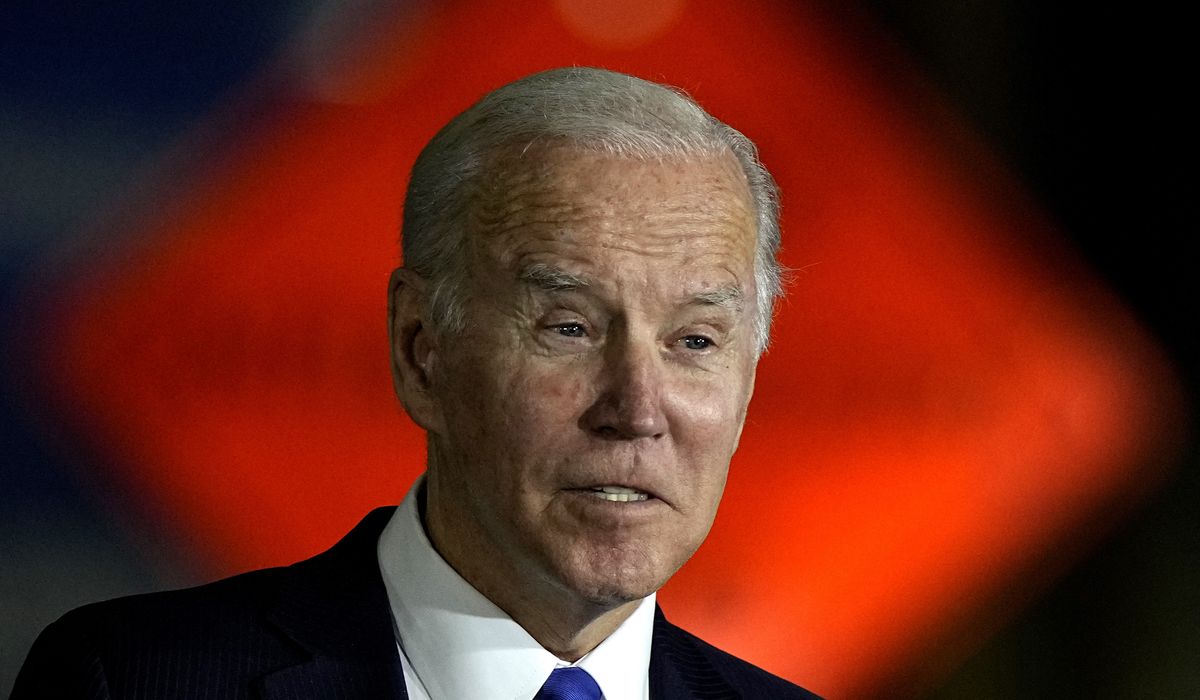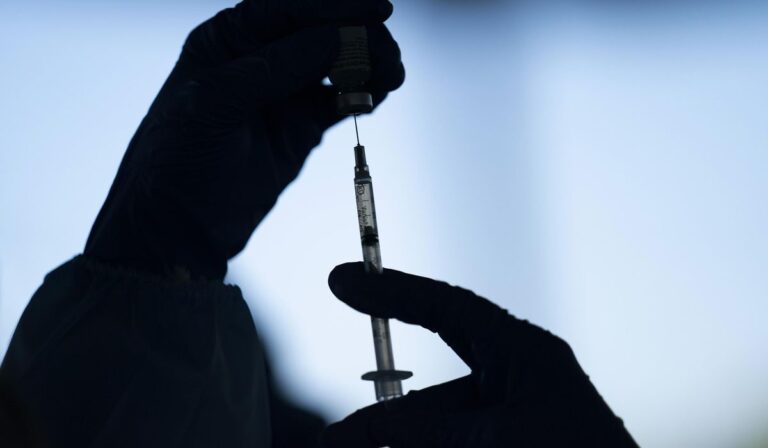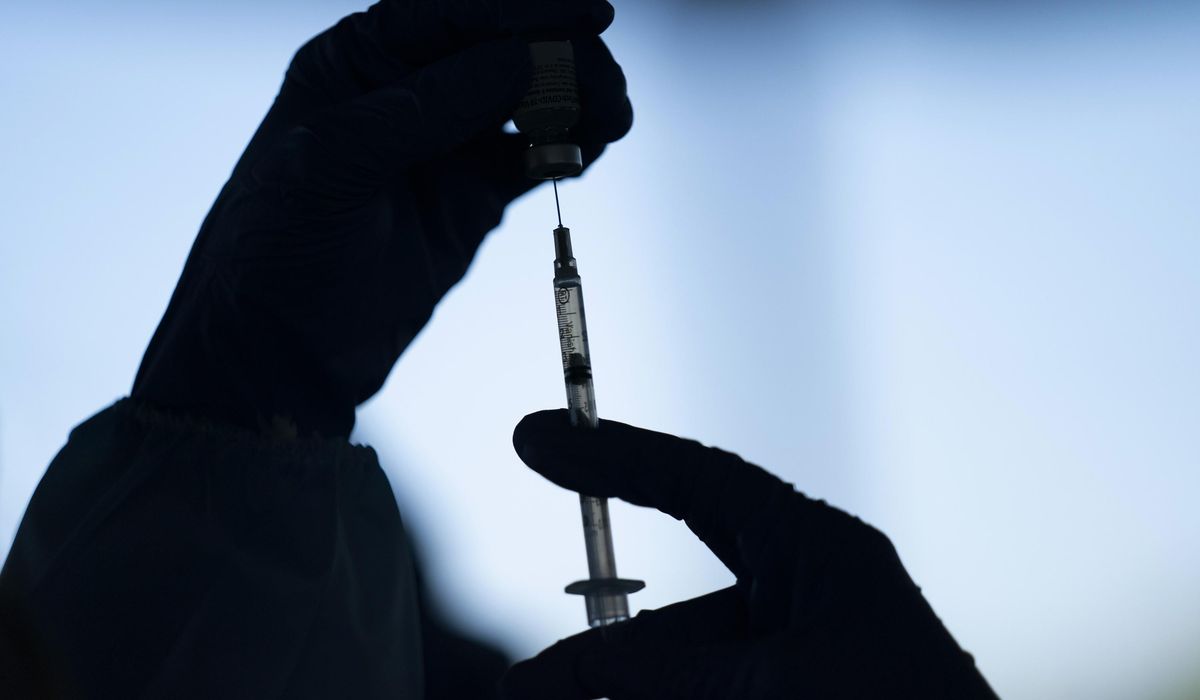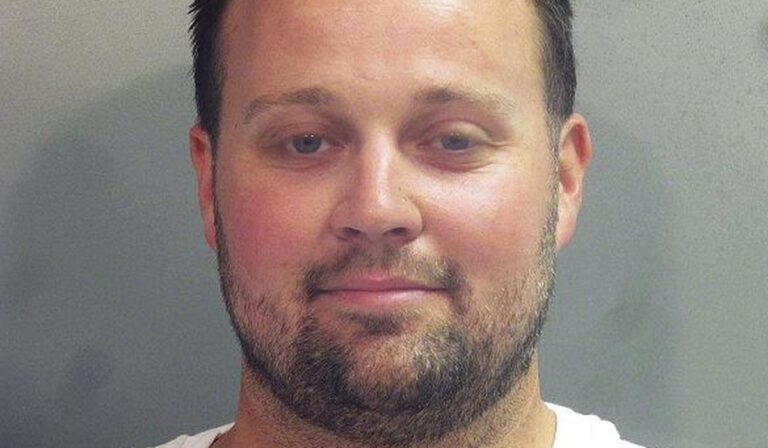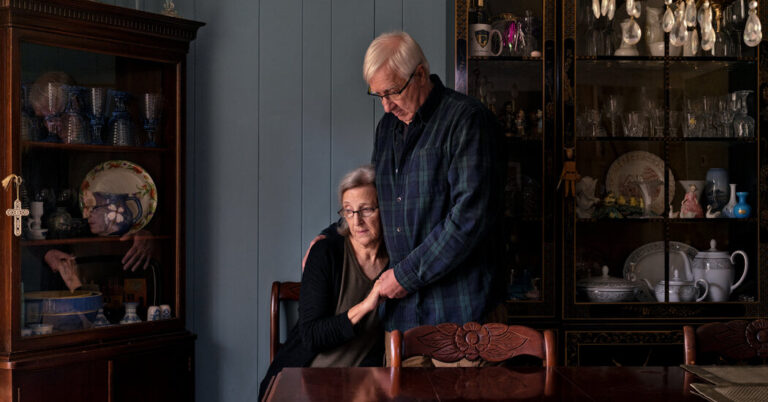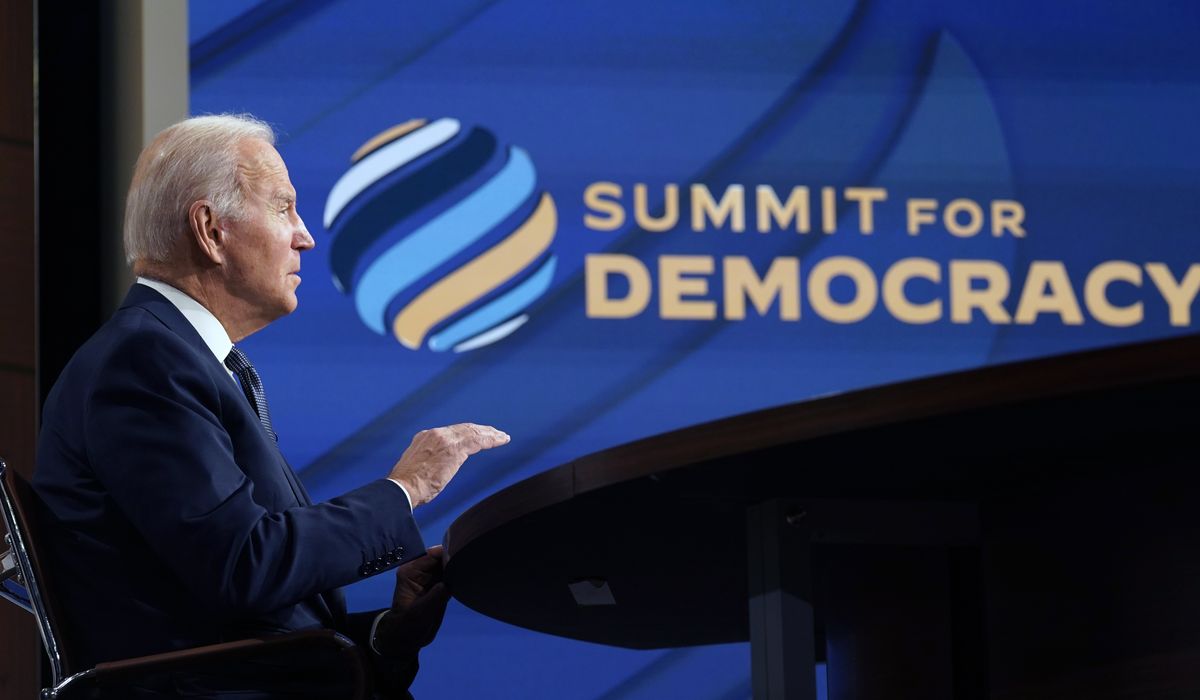
President Biden called on more than 100 world leaders gathered for the opening of his “Summit for Democracy” on Thursday to stand together in battling a “backward slide of rights and democracy” in the face of rising authoritarianism around the world.
“We stand at an inflection point in our history,” the president said.
Mr. Biden wants to make the two-day virtual summit a focal point of his administration’s global messaging at a moment of growing concern about the influence of nondemocratic governments such as communist China, autocratic Russia and theocratic Iran.
Some major U.S. allies were left off the invitation list. Regardless, Mr. Biden seized the moment to try to project American leadership to strengthen democracy and demonstrate its worth in a changing world. With Russian and Chinese diplomats questioning the premise of the summit, a full day of breakout sessions and panel discussions left many wondering whether all the talk will lead to action.
Still, Mr. Biden said, “This is the defining challenge of our time.”
“We’re bringing together leaders from more than 100 governments alongside activists, trade unionists and other members of civil society … not to assert that any one of our democracies is perfect or has all the answers, but to lock arms and reaffirm our shared commitment to make our democracies better,” he said.
The goal of the vast virtual gathering, Mr. Biden said, is to “share ideas and learn from each other and to make concrete commitments of how — how to strengthen our own democracies and push back on authoritarianism, fight corruption, promote and protect human rights of people everywhere.
“To act,” he added for emphasis, “to act.”
The message appeared to resonate among the leaders.
Others took turns delivering remarks, many prerecorded, on the state of democracy. The messages often reflected on the stress on their nations of rapidly evolving technology. They also bemoaned the increase in disinformation campaigns to undermine representative institutions and elections.
“The democratic conversation is changing,” said Danish Prime Minister Mette Frederiksen. “New technologies and large tech companies are increasingly setting the stage for the democratic dialogue, sometimes with more emphasis on reach than on freedom of speech.”
Such concerns are widespread. Several democracy activist groups used the summit to pitch analyses of the struggling state of democracy in the world, including the U.S.
The International Institute for Democracy and Electoral Assistance said in its annual report that the number of countries experiencing democratic backsliding “has never been as high” as in the past decade. The U.S. was added to the list alongside India and Brazil.
Some say the administration is projecting a domestic problem — vicious political divisions challenging American democracy from within — onto the international stage.
Mr. Biden made no specific reference to Russia or China, although he wasted little time before speaking about American efforts for racial and gender justice and equality, voting rights and laborers’ rights to organize.
“Here in the United States, we know as well as anyone that renewing our democracy and strengthening our democratic institutions requires constant effort,” the president said.
Some perceived the reference to “renewing” democracy as an attempt to stoke fervor around the notion that President Trump oversaw a major decline in democracy, underscored by demonstrators’ Jan. 6 storming of the U.S. Capitol.
In closing remarks on the first day of the summit, Vice President Kamala Harris said “Jan. 6 looms large in our collective conscience.”
“Here in the United States, we know that our democracy is not immune from threats,” said Ms. Harris. She said “anti-voter laws that many states have passed are part of an intentional effort to exclude Americans from participating in our democracy.”
Invitation politics
Some foreign leaders whose countries weren’t invited have expressed frustration. Hungarian Foreign Minister Peter Szijjarto dismissed the summit as a “domestic political-type of event” where leaders with a good relationship with Mr. Trump were not invited.
However, the criteria for the invitation list have been anything but clear-cut. Pakistani Prime Minister Imran Khan, who was invited, built a close relationship with Mr. Trump but has yet to even talk by telephone with Mr. Biden. Bangladesh, Singapore, Hungary, and even NATO ally Turkey were not on the list.
The White House has been tight-lipped while observers speculate about snubbing nations for leaning toward authoritarianism while including others for strategic reasons.
Some analysts say the summit can already claim some significant successes. “Like any good dinner party, who gets invited usually determines the quality of the evening and the mood for future such gatherings,” said Ted Piccone, a nonresident senior fellow with the Brookings Institution.
“In the case of the Summit for Democracy, if the heads of state and government of some 112 countries (including the United States) bring to the meal some honest recognition of their shortcomings (humble pie), along with concrete pledges for reform and cooperation (the main course), the convening would have been worth the effort,” Mr. Piccone wrote on the liberal think tank’s website this week.
Mr. Biden called the summit a critical moment for leaders to redouble their efforts to bolster democracies. He has repeatedly said the U.S. and like-minded allies need to show the world that democracy is a far better vehicle for societies than autocracy.
That is a central tenet of Mr. Biden’s foreign policy outlook, which he promised would be more outward-looking than Mr. Trump’s “America First” approach. In his remarks, the president announced he was starting an initiative to spend up to $424 million for programming around the world that supports independent media, anti-corruption work and more.
The gathering drew expected backlash from chief U.S. adversaries and other nations that were not invited.
Chinese officials accused the White House of using the summit to ratchet up Cold War-style tensions with Beijing. “This year marks the 30th anniversary of the end of the Cold War,” Chinese Foreign Ministry spokesperson Wang Wenbin told reporters this week. “The U.S. hosting of the summit for democracy is a dangerous move to rekindle the Cold War mentality, to which the international community should be on high alert.”
Ahead of the summit, the ambassadors to the U.S. from China and Russia wrote a joint essay saying the Biden administration is exhibiting a “Cold-War mentality” that will “stoke up ideological confrontation and a rift in the world.”
Mr. Biden is pressing Russian President Vladimir Putin to stand down after a massive buildup of troops on the Ukrainian border, creating growing concern in Washington and European capitals that Russia will again invade the former Soviet state. Mr. Biden said Wednesday that he warned Mr. Putin in a Tuesday video call of “severe consequences” of an invasion.
Ukrainian President Volodymyr Zelenskyy, who participated in Thursday’s summit and later spoke by phone with Mr. Biden, said in a post on Twitter, “Democracy is not a given, it must be fought for.”
Polish President Andrzej Duda also spoke out against Russia. In his address, he decried Moscow’s support of Belarus. Poland and Western allies have accused Belarusian President Alexander Lukashenko of using migrants as pawns to destabilize the 27-nation European Union in retaliation for its sanctions on his authoritarian regime.
• This article is based in part on wire service reports.

